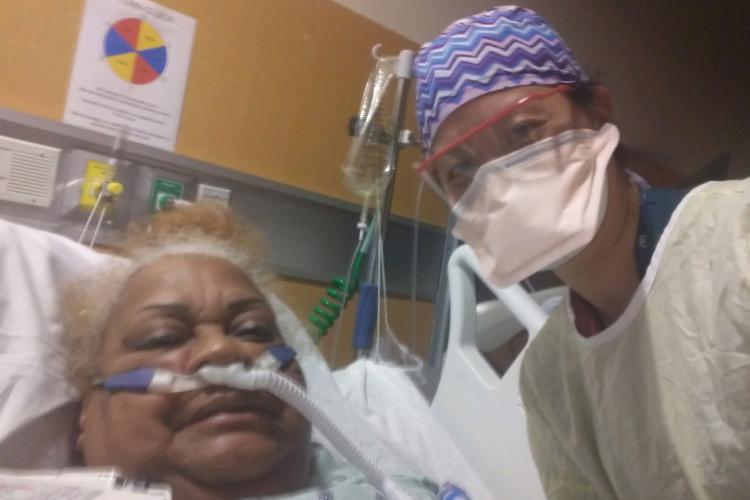
She had no doubts about the skill of her caregivers. But, when Etta Hammie arrived at JPS Health Network in November suffering severe COVID-19 symptoms, she didn’t think she had the strength to go on.
“I’ve been a nurse for many years, and I told them when I got here that I didn’t want any part of a ventilator,” Hammie said. “But it was only a short time before things started to get worse and the doctor came to me to say that she was concerned I was getting too weak to survive without help.”
Dr. Jocelyn Zee told Hammie she had faith the patient could get better -- if she would just accept the ventilator for a few days. Reluctantly, Etta agreed. But she said, as she feared, it was nightmarish to have a tube running down her throat as she slipped in and out of semi-consciousness because of sedation, suffering all the while from hallucinations.
On the fifth day she was on the ventilator, Hammie was exhausted both mentally and physically. She was surprisingly alert from her sedation that day when she gestured for the nurse in her room to hand her a piece of paper and a pen from the table near her bed.
“Of sound mind,” She wrote. “D.N.R.”
"That kind gesture made a world of difference for me."
It was a simple message that she was ready to give up the fight: Withdraw life support, and Do Not Resuscitate.
RN Taylor Wauson, the recipient of the message, was shocked and heartbroken.
“We all work so hard and so closely with these patients,” Wauson said. “You tend to get attached to them. I had been working with (Hammie) for four days straight and I believed she was improving. And now she wanted to give up.”
He wasn’t ready, however, to give up on her. He was determined to convince her to fight on even though he realized it was ultimately her decision.
Wauson conferred with physicians and confirmed his assessment of the situation. Etta was, in fact, getting stronger. She could make it if she would just fight on a little longer. He managed to negotiate a deal with her: Give us two more days to make you strong enough to breathe on your own. In 48 hours the ventilator was coming off and either Hammie would survive – or else her doctors would let her go peacefully.
“You try to leave work behind when you go home,” Wauson said. “But I’ve definitely never been in a situation like this before. It was a lot of pressure to suddenly have a deadline, and I couldn’t get it off my mind at the end of my shift.”
But the agreement suddenly gave Etta peace.
“Suddenly it didn’t feel like this was going on forever anymore,” Hammie said. “I felt like I could make it for just two days. It really made me feel like I could handle this and gave me the strength to continue the fight.”
Meanwhile, another kind gesture from a nurse also contributed to Etta’s strength. She asked the patient if she’d like to listen to some music and offered the headphones that helped her get through long, taxing shifts in the COVID-19 Intensive Care Unit to Hammie.
“I asked her if she could put on some gospel,” Etta said. “And as soon as it started to play, I felt the weight come off my chest. Suddenly, I had something to focus on. Even when that nurse’s shift was over, those songs were programmed into me and I would sing them in my head for the rest of my time in the hospital. That kind gesture made a world of difference for me.”
Ready to give up at Thanksgiving time, Etta made it to the seventh day on the ventilator and, when it was time to shut the machine off, she was ready to breathe on her own. She needed some supplemental oxygen at first, but by that afternoon, she was rebounding rapidly.
“After a couple of hours, they turned the oxygen down,” Etta said. “By the end of the day,” I was sitting on the edge of the bed, drinking a Coke.”
Resigned to the thought that she would never see her family again, Hammie was sent home to her daughter and grandchildren in time to celebrate the most precious Christmas of her life.
